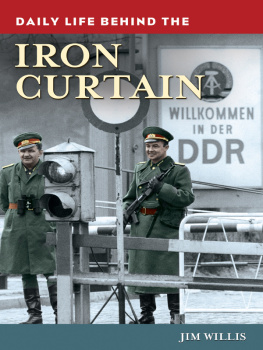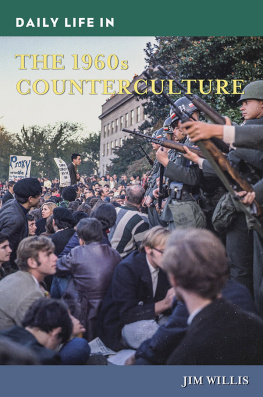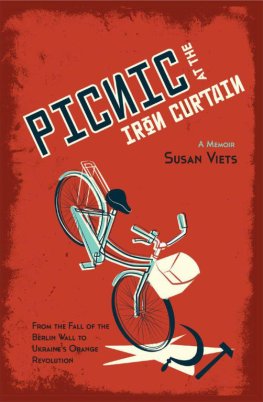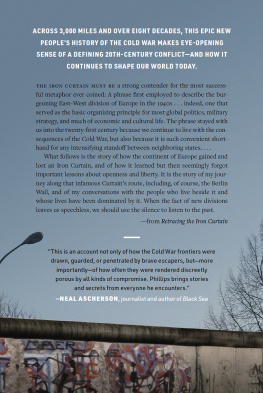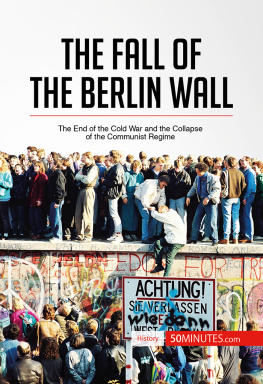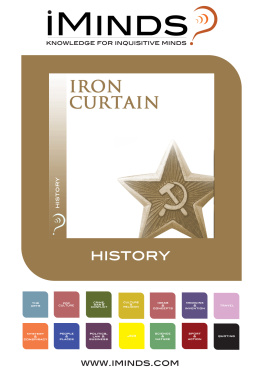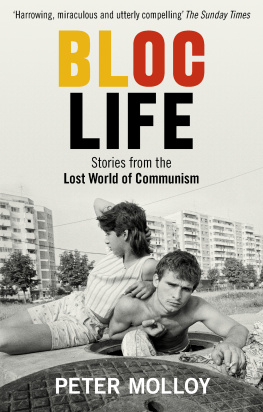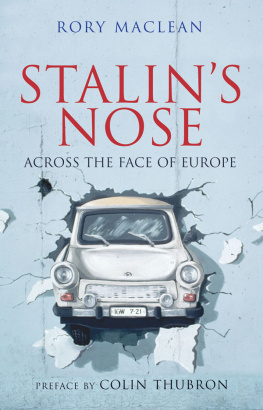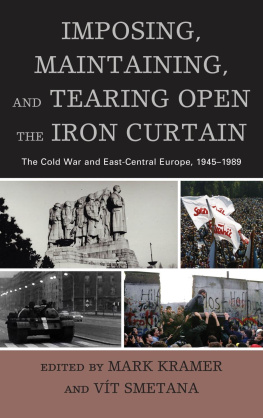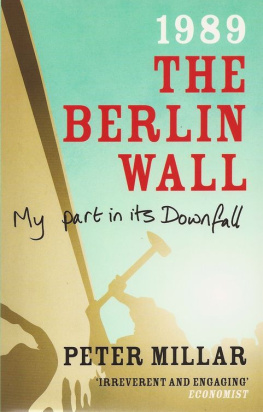DAILY LIFE BEHIND THE
IRON CURTAIN
JIM WILLIS
The Greenwood Press Daily Life Through History Series

AN IMPRINT OF ABC-CLIO, LLC
Santa Barbara, California Denver, Colorado Oxford, England
Copyright 2013 by Jim Willis
All rights reserved. No part of this publication may be reproduced, stored in a retrieval system, or transmitted, in any form or by any means, electronic, mechanical, photocopying, recording, or otherwise, except for the inclusion of brief quotations in a review, without prior permission in writing from the publisher.
Library of Congress Cataloging-in-Publication Data
Willis, Jim, 1946 Mar. 19
Daily life behind the Iron Curtain / Jim Willis.
pages cm. (The Greenwood Press daily life through history series)
Includes bibliographical references and index.
ISBN 9780313397622 (cloth : acid-free paper) ISBN 9780313397639 (ebook) 1. Europe, EasternSocial life and customs20th century. 2. Europe, EasternSocial conditions20th century. 3. CommunismSocial aspectsEurope, EasternHistory20th century. 4. Communist countriesSocial life and customs. 5. Communist countriesSocial conditions. 6. Berlin Wall, Berlin, Germany, 19611989. I. Title.
DJK50.W55 2013
947.0009'045dc23 2012036348
ISBN: 9780313397622
EISBN: 9780313397639
17 16 15 14 13 1 2 3 4 5
This book is also available on the World Wide Web as an eBook.
Visit www.abc-clio.com for details.
Greenwood
An Imprint of ABC-CLIO, LLC
ABC-CLIO, LLC
130 Cremona Drive, P.O. Box 1911
Santa Barbara, California 93116-1911
This book is printed on acid-free paper 
Manufactured in the United States of America
This book is dedicated to the collective source of my wisdom:
Mom, Dad, C. J., and Annie
PREFACE: FROM WAR TO OPPRESSIONTHEN HOPE
Imagine you are a young Berliner, 16 years old, when World War II finally comes to an end in 1945 Europe. If you are a boy, you have managed to escape conscription into the war by an army that was drafting some teenagers even younger than you. But, for as long as you can remember, you have lived in a country consumed by angry rhetoric, violence, and now the devastation wrought by the Allied victory that has crushed the German army and the cities and towns of Germany along with it. You are a bundle of mixed emotions because, although your country has just lost this war and you have lost loved ones in it, the war isin factfinally over. You may be standing in streets filled with rubble from what used to be beautiful buildings, but at least you are standing. You are alive, and the fighting is over. No more bombing raids at night or during the day. Tomorrow may bring many questions about what comes next, but at least the fighting and the bombing are over.
As the days, weeks, months, and years progress, you pitch in and help find ways to feed your family and to start rebuilding your home and neighborhood. The end of the war has brought people from different lands to that neighborhood: American, French, British, and Russian soldiers are regular sights in the streets and evening places. You have been tossed a few candy bars yourself by passing American GIs, and they have been luxuries you've treasured. News of the Berlin airdrops has reached your neighborhood, and it looks like help has come in the form of food from your country's former enemies. The days start to look brighter; indeed the entire future does.
Before long, however, you see that your country of Germany and your city of Berlin are going to have to pay the price for the imperialism that brought on the onslaught of the Allied armies. Your country is being divided into East and West Germany, and your Berlin is in the East. But only part of the city is becoming a part of East Germany; the rest is being divided into three other sectors to be controlled by France, Great Britain, and the United States.
Unfortunately, as you will soon come to see, East Berlin will fall under a new totalitarian regime, and the political party controlling it and all of East Germany is known as the Communist Party. You quickly come to learn the new rules of life for living in East Germany, and they don't seem to offer too much in the way of personal freedoms, despite the name given to your new country: the German Democratic Republic, or GDR.
At the age of 20, when most that age are thinking they have their whole lives ahead of them to plan out as they wish, you wonder seriously about that. Travel restrictions have already been imposed, and there are many stories of East Germans who are already finding ways of getting out of what appears to be some oppressive years ahead. There is still some freedom of movement, however, so you decide to stick it out and start your career, perhaps in a construction trade, working for the new collectivist system known to you as Communism.
You marry, start a family, and often give thought to joining others who are escaping to West Berlin. About the time you develop the resolve to do that, however, it is the summer of 1961. As you fine-tune your plan to get your family out to the West, it is already August. Then one morning during that month, you wake up and discover that the path to the West is blocked. Overnight, construction has begun on a new set of barriers to keep you, your family, and all your countrymen and -women locked into East Germany. The new barrier is coming to be known as the Berlin Wall. It starts with barbed wire, but it will end with a 10-foot concrete-and-steel wall surrounding the city of West Berlin that will be fortified by an inner wall on the eastern side of a region. The land in between will be covered with mines and guard dogs and will become known simply as the death strip.
Will you ever achieve the hope and dreams you had when you realized the last Allied bombs had fallen on your city in 1945? It doesn't look good. In reality, you will be 60 years old before that Wall comes down and the oppression of Communist rule has vanished from East Germany and all of Eastern Europe.
What was it like to live behind the barrier, known alternatively as the Berlin Wall, the Monster, or the Iron Curtain? That is the question that this book will seek to answer. Much of the focus will be on the countries and people of Germany and Russia, because:
1. Russia was the epicenter of power for Communist East Europe, and the policies and daily regulations of the Sovietbloc countries were often enforced with Soviet tanks.
2. Germany was the country straddling the East-West, or Communist-Free Europe divide. Following World War II, this country was split in half, with the West becoming the Federal Republic of Germany (FRG) and the East becoming the German Democratic Republic (GDR). As was noted earlier, despite the name given East Germany, it was anything but democratic and was controlled entirely by the oppressive Communist Party. The city of Berlin was the flashpoint for East-West confrontations becauselike the country of Germanyit was divided into Communist East Berlin and democratic West Berlin. However, since the city was entirely in East Germany, it came to be totally surrounded by the 10-foot Monster of the Berlin Wall, which the GDR euphemistically called the anti-fascist protective rampart. It was at the base of this Wall that the life-and-death issues of living in free versus Communist Germany were played out with regularity.

